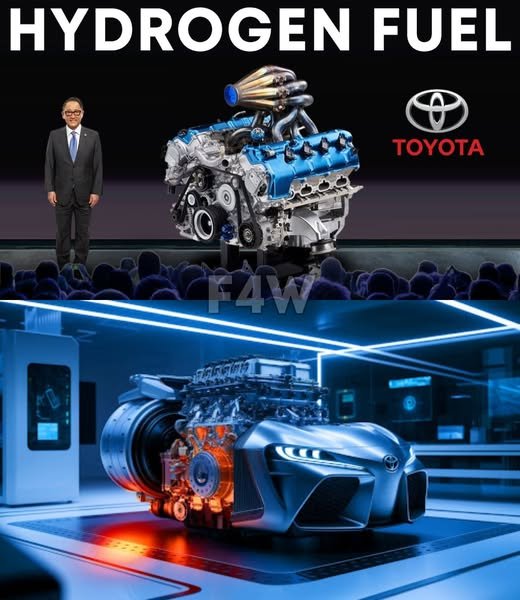In a highly anticipated announcement, Toyota has unveiled its new hydrogen combustion engine, a development that has sent shockwaves through the automotive industry. This innovative technology promises to transform the landscape of sustainable transportation, positioning hydrogen as a viable alternative to both traditional internal combustion engines and battery electric vehicles (EVs). However, the unveiling of this engine has sparked a heated debate regarding its practicality, environmental impact, and the future of hydrogen as an energy source.
At first glance, the hydrogen combustion engine appears to be a groundbreaking solution to the pressing need for cleaner transportation. By burning hydrogen instead of fossil fuels, the engine produces only water vapor as a byproduct, offering a zero-emission alternative to gasoline and diesel vehicles. Proponents argue that this technology could significantly reduce greenhouse gas emissions and help combat climate change, aligning with global efforts to transition to more sustainable energy sources.
However, the announcement raises critical questions about the feasibility of hydrogen combustion technology in the real world. While the concept is appealing, skeptics point out that hydrogen production is often reliant on fossil fuels through processes like steam methane reforming. This raises concerns about the overall carbon footprint of hydrogen vehicles and whether they can truly be considered “green.” Critics argue that without a significant shift towards renewable hydrogen production methods, such as electrolysis using solar or wind energy, hydrogen vehicles may not deliver the environmental benefits they promise.
Moreover, the infrastructure required to support hydrogen combustion engines remains a significant hurdle. Unlike electric vehicles, which benefit from a growing network of charging stations, hydrogen refueling stations are still sparse, particularly in many parts of the world. The logistical challenges of transporting and storing hydrogen safely and efficiently add another layer of complexity. Without substantial investment in infrastructure, the widespread adoption of hydrogen vehicles may be hampered, leading to questions about their practicality for consumers.
Toyota’s focus on hydrogen combustion also invites scrutiny regarding its potential impact on the electric vehicle market. As major automakers globally ramp up their investments in EV technology, some industry experts argue that the resources devoted to hydrogen development could detract from efforts to enhance battery technology and charging infrastructure. With electric vehicles gaining popularity and improving in terms of range and affordability, is it wise for Toyota to stake its future on hydrogen, a technology that has yet to prove its viability on a large scale?
Additionally, the hydrogen combustion engine raises important discussions about consumer acceptance. Many drivers are still unfamiliar with hydrogen as a fuel source, and there may be skepticism regarding its safety and reliability. The perception of hydrogen as a high-risk fuel, combined with the existing popularity of electric vehicles, could hinder consumer interest in hydrogen-powered cars.
However, supporters of Toyota’s hydrogen initiative assert that this technology could pave the way for a more diversified energy landscape. By offering an alternative to battery electric vehicles, hydrogen combustion engines could appeal to consumers who are hesitant about EVs due to concerns about battery life, range, and charging times. This diversification may ultimately enhance competition in the automotive industry, driving innovation and leading to better options for consumers.
In conclusion, Toyota’s revelation of a new hydrogen combustion engine has the potential to be a game changer in the automotive industry, but it also raises a host of contentious issues. While the promise of zero-emission driving is enticing, the challenges surrounding hydrogen production, infrastructure, and consumer acceptance cannot be ignored. As the industry grapples with the future of sustainable transportation, Toyota’s bold move will undoubtedly continue to spark debate and shape the conversation around the role of hydrogen in our energy future. Whether this technology will realize its potential or become another chapter in the long history of hydrogen hype remains to be seen.



